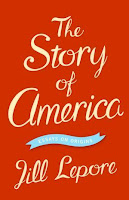The Boston Globe also has a review of The Story of America. Kate Tuttle writes that Lepore's "essays feel remarkably relevant, grappling with ideas about race, equality, voting rights, taxes, poverty, the role of America in the world."
For more on origins: In the Wall Street Journal this week, Kenneth Minogue writes about two books on the history of free-market thought. Both, according to Minogue, shed light on the current state of the economy:
Everyone agrees we are going through a crisis—but a crisis of what? The members of the Occupy Wall Street movement think it is a crisis of capitalism. Others think the crisis is moral: Our propensity to consume without thought for the planet, the poor or even the person next door is a sign that greed and fear are the motives of the moment. Meanwhile, economists debate the significance of reducing the national debt or pouring more money into a stimulus that might restore our economic dynamism. Amid such confusion, we need wisdom—and historians who might help by telling us how we got into this scrape in the first place.Those historians include Angus Burgin, Assistant Professor of History at Johns Hopkins, whose book The Great Persuasion: Reinventing Free Markets Since the Depression (Harvard) "offers a concise account of how F.A. Hayek and later Milton Friedman disseminated the virtues of free markets and enlivened conservatism in Britain and the United states," and Daniel Stedman Jones, a London barrister. According to Minogue, "the virtues" of his book Masters of the Universe: Hayek, Friedman, and the Birth of Neoliberal Politics (Princeton) "are compromised by more adjectival attiduinizing than a chronicler of of history should allow himself." You can find the complete review here.
And in the LA Times this week you can read another review of The Partisan: The Life of William Rehnquist (Public Affairs) by John A. Jenkins. Jim Newton begins:
Chief Justice William H. Rehnquist was a curious man. He could be courtly and gracious, elegant in argument and a brilliant advocate. He also was a ferocious adversary, a relentless conservative and, as John A. Jenkins makes clear in his new biography, a determined partisan.You can read the full review here.
Other reviews of interest this week include a review in the Washington Post of The Generals: American Military Command from World War II to Today (Penguin) by Thomas E. Ricks, and a review of Mark Bowden's The Finish: The Killing of Osama Bin Laden (Atlantic Monthly). And in TNR: The Book: a review of Joan Walsh's What's the Matter with White People?: Why We Long for a Golden Age that Never Was (Wiley).
Over at the New York Times , rock fans will enjoy two reviews: this one, on Neil Young's Waging Heavy Peace: A Hippie Dream (Blue Rider) and this one on Pete Townshend's memoir Who I Am: A Memoir (Harper/HarperCollins) (The LA Times also has a review of Who I Am, here).

